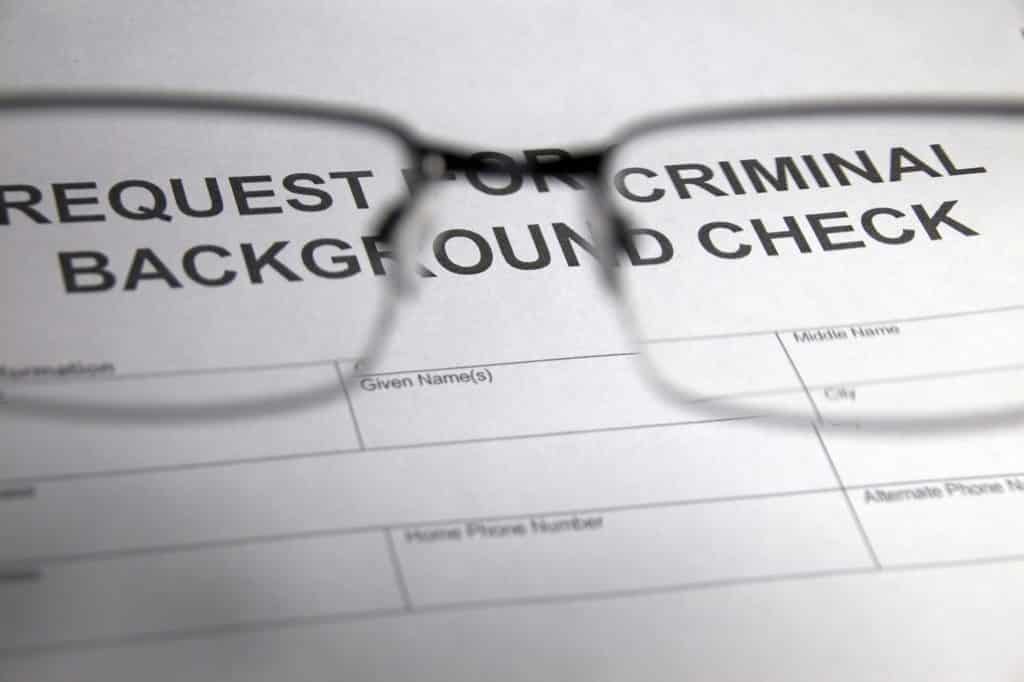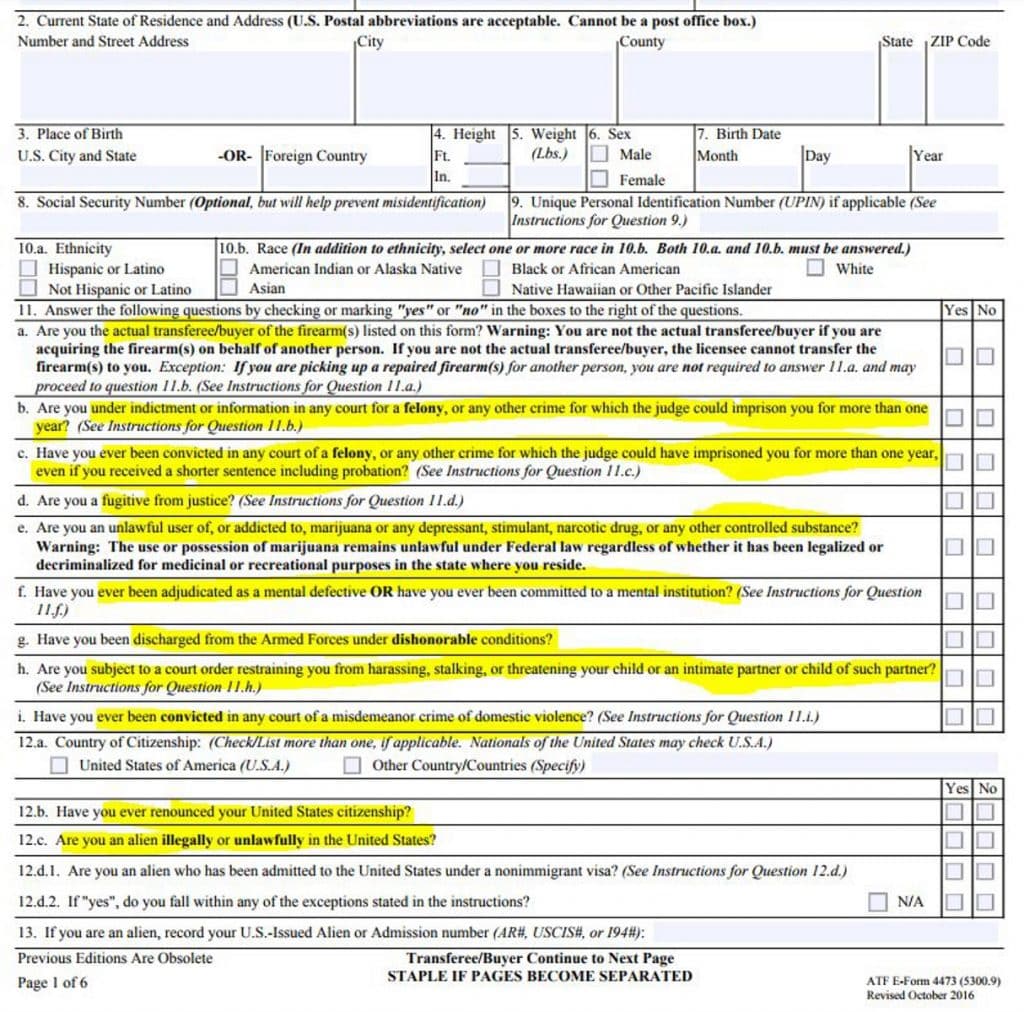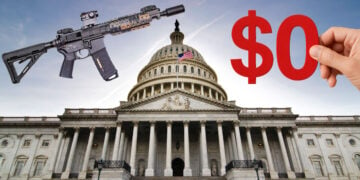Most reports now indicate that the recent mass-shooting tragedy in Sutherland Springs, Texas might have been prevented if important criminal record data was properly reported and recorded in federal and state background check (BGC) systems. It seems, based on preliminary reports now, that the Texas shooter was legally prohibited from possessing a firearm, but he still passed a BGC due to poor record keeping. There are presently-existing various state and federal requirements, procedures, and laws for maintaining relevant records and BGCs for obtaining firearms, but there are many differences among states and federal agencies. Definitions and requirements’ interpretations and records kept are not all or completely shared. The Gun Control Act, federal U.S. Code 92, primarily relates to regulating interstate commerce in firearms by prohibiting interstate firearms transfers and regulating the Federal Firearms License (FFL) System. Some say it does not sufficiently address individual BGCs. All of the firearms laws can and do change regularly, so understand this, especially for your state, and double check the federal law and your states’ current related laws and regulations.
State Background Check Systems Vary Considerably
In addition to the many different state laws regulating gun ownership and their related recordkeeping, there are different state BGC systems and three key federal BGC entities that maintain BGC records to prohibit certain specific individuals from purchasing firearms. I want to first present the three federal BGC entities and the role of the Federal Bureau of Investigation (FBI) as a foundation for the interface among the states. Then, generally review the complex and VOLUNTARY state BGC systems (including Texas), so you will have an understanding of how fluid the systems are and how they currently work, given the recent shooting tragedy in Sutherland Springs. Finally, I will give some of my opinions and conclusions for improving the BGC systems.
The three federal entities are:
- National Crime Information Center (NCIC)
- Interstate Identification Index (III)
- National Instant Criminal Background Check System (NICS.)
NCIC
The FBI maintains the NCIC, which is an electronic clearinghouse of crime data that can be tapped into by nationwide criminal justice agencies. It helps apprehend fugitives, locate missing persons, identify terrorists, and provide information to assist law enforcement officers in their duties, etc. At the end of 2015, NCIC contained over 12 million active records. Some of the maintained records include: National Sex Offender Registry, Foreign Fugitives, Immigration Violators, Missing Persons, Gang members, Suspected Terrorists, Violent Persons, and NICS Denied Transactions.
III
This national Index is maintained by the FBI and contains automated criminal history record information, including criminal “Rap Sheets,” and is accessible through the same network as NCIC. All FBI BGCs include a summary of an individual’s criminal history through information gathered from fingerprint matches by III obtained through federal, state, and local law enforcement agencies.
NICS
According to the FBI.gov website, NICS is a national system that instantly checks available records on persons who may be disqualified from receiving firearms or ineligible to make a firearm purchase. It determines whether the transfer of a firearm would be in violation of Section 922 (g) or (n) of Title 18, United States Code, or state law. NICS is the main, key BGC system.
The FBI developed the system in 1998 through a cooperative effort with the Bureau of Alcohol, Tobacco, Firearms, and Explosives (ATF) and local and state law enforcement agencies. The NICS is a computerized BGC system designed to respond instantly to most BGC inquiries, so the Federal Firearms Licensees (FFLs) receive an almost immediate response. Depending on the willingness of state governments to act as a liaison for the NICS, the FFLs contact either the FBI or a designated state Point of Contact (POC) to initiate BGCs on individuals possessing or receiving firearms. Below, are the total NICS BGCs by year from BGC program beginning in 1998 thru the year 2016, with totals. Later, I give the BGC process, as performed by the FBI and by state POCs.
Total NICS Background Checks – 1998 Thru 2016
![NICS TOTAL BACKGROUND CHECKS- thru 2016 [1280x768]](https://www.usacarry.com/wp-content/uploads/2017/11/4-NICS-TOTAL-BACKGROUND-CHECKS-thru-2016-1280x768.jpg)
The FBI and ATF are Busy Investigating Backgrounds
The FBI says that more than 253 million NICS BGCs have been made through March 2017, leading to more than 1.3 million denials. NICS is mandated by the Brady Handgun Violence Prevention Act of 1993. NICS is located at the FBI’s Criminal Justice Information Services Division in Clarksburg, West Virginia. The FBI reported in 2014 that about 91% of NICS BGCs provide an answer within a few minutes, about 9% require further investigation and review by FBI and ATF agents. But, due to the federal “default proceed” rule, those agents only have three business days to conduct and finish their investigations.
State Participation in the NICS System — A Complex Dilemma
STATE participation in the NICS BGC System is VOLUNTARY, as the federal government cannot mandate participation due to the 10th Amendment of the U.S. Constitution. The FBI.gov website says it currently provides full service to FFLs in 30 states, five U.S. territories, and the District of Columbia. Understand that this number can change.
Thirteen states have agencies acting on behalf of the NICS in a Full Point-of-Contact (POC) capacity. These POC states, which have agreed to implement and maintain their own Brady NICS Program, conduct firearm BGCs for FFLs’ transactions in their respective states by electronically accessing the NICS. Upon completion of the required ATF Form 4473, the FFLs conducting business in the POC states contact a designated STATE agency to initiate a NICS BGC instead of contacting the federal NICS Section.
The current 13 Full-POC States (contact State/Territory for ALL firearm BGCs, including permits) are:
- California, Colorado, Connecticut, Florida, Hawaii, Illinois, Nevada, New Jersey, Oregon, Pennsylvania, Tennessee, Utah, Virginia
Seven states are currently sharing responsibility with the NICS Section by acting as partial POCs. Partial-POC states have agencies designated to conduct checks for handguns and handgun permits, while the federal NICS Section handles the processing of the state’s transactions for long gun purchases.
The current 7 Partial-POC States (contact State for handgun and FBI for long gun background checks) are:
- Maryland, New Hampshire, Washington, Wisconsin, Iowa, Nebraska, North Carolina
Thirty-six states/territories do not have POC status and rely on NICS for ALL firearm BGCs.
The current 36 Non-POC States(30)/Territories(6) (contact FBI for ALL firearm BGCs) are:
Alabama, Alaska, American Samoa, Arizona, Arkansas, Delaware, District of Columbia, Georgia, Guam, Idaho, Indiana, Kansas, Kentucky, Louisiana, Maine, Massachusetts, Michigan, Minnesota, Mississippi, Missouri, Montana, New Mexico, New York, North Dakota, Northern Mariana Islands, Ohio, Oklahoma, Puerto Rico, Rhode Island, South Carolina, South Dakota, Texas, Vermont, Virgin Islands, West Virginia, Wyoming

Background Checks Rely on ATF Form 4473 Information from Buyer
For this old management professor, any system is only as good as the input received from its elements or participants. So, the same holds true for a BGC System for firearms. It is only as valid as the data and information submitted by potential buyers and transferees to the system database. While the Form collecting this important data must be reliable and in-depth enough, the individual’s input and the system’s structure and function are critical. The number of active adjudicated Mental Health Records in the NICS Index was recently acquired from the FBI by the National Shooting Sports Foundation (NSSF.) They found that far too many states failed to submit these Mental Health Records that established someone is prohibited from owning a firearm under current law. 19 states had made fewer than 100 records available, and 12 of these had made fewer than ten records available, per the NSSF. Of course, we are aware of the Texas shootings and the very recent failure to report key data. Sad and for me NOT ACCEPTABLE!
The FFL System for Background Checks
We have BGC systems, procedures, and forms in place, but need to ensure sufficient and reliable data is present in them. Upon completion of the required Bureau of Alcohol, Tobacco, Firearms and Explosives (ATF) Form 4473 by the transferee/buyer, FFLs contact the NICS Section (and/or State) via a toll-free telephone number or electronically on the Internet through the NICS E-Check System to request a BGC with the descriptive information PROVIDED BY THE BUYER on the ATF Form 4473. NICS is customarily available 17 hours a day, seven days a week, including holidays (except for Christmas). Can a transferee/buyer LIE ON THE FORM? Well, they certainly can and do. So, do we hold a gun to the requestor’s head and “encourage” them to provide genuine, complete, and truthful data and information? NO, we cannot and should NOT do that! But what do we do to ensure valid and reliable input? Changing the Form questions asked, adding more of them, and passing more laws are probably NOT the panacea for our dilemma. There are already tools, methods, procedures, and some funding penalties in place to encourage states and federal agencies to submit proper, complete, and more records. But, is this sufficient?
NICS Background Check System Must Respond Within 3 Business Days
A gun purchase can be completed if the FBI’s NICS check does not identify any problem, OR the system does not respond within three business days. Early indications suggest that the recent Texas church shooter was able to pass an FBI BGC and purchase firearms in the years after he was convicted in a court-martial of assaulting his ex-wife and stepson because the Air Force failed to submit his disqualifying criminal record to the FBI. “Initial information indicates that his domestic violence offense was not entered into the NICS database by the Holloman Air Force Base Office of Special Investigations,” said Ann Stefanek, an Air Force spokesperson. I believe this is a critical issue that must be resolved quickly. But, perhaps three days is too soon for a final response decision affecting a possible life-or-death matter?
Mental Health and Disqualifying Mental Health Records
Mental Health problems can cover a broad range of disorders, but the common characteristics are that they all affect the affected person’s personality, thought processes, mood, social interactions, and behaviors. Mental Health disorders can be difficult to diagnose by medical professionals, unlike physical illnesses clearly, but can have very significant effects when associated with a firearm. Certainly, many people have Mental Health CONCERNS from time to time, and it can be difficult for even us lay folks to differentiate from mental health illnesses, like anxiety disorders, clinical depression, bipolar disorders, schizophrenia, and violent and addictive behaviors. Most of us worry and have usual anxieties at times. This affects how we handle stress, relate to others, and make choices and decisions. Many of us may not recognize and understand the extreme symptoms, like very confused thinking, extreme irritability, extreme highs and lows, excessive worries and anxieties, strong feelings of anger, suicidal thoughts, and inability to cope with daily problems and activities. We do not put “2 and 2” together and sometimes inadvertently let behaviors and situations “slide,” without the necessary attention.
I believe that we need to focus on those with documented mental health DISORDER problems that disqualify them from owning and using a firearm. Past shooting tragedies have strongly indicated that somewhere in the shooters histories, there were documented mental health disorder problems, with some spending time in mental institutions or treatment centers. This is very key need-to-know information and, of course, must be professionally recognized, solidly verified, and appropriately acted upon. There was an effort to improve NICS from 2013-2016, and the number of disqualifying Mental Health records submitted to NICS increased by 170% to about 4.5 million. So there have been improvements, but more still need to be made. I believe this is a top priority: Identifying (and treating) those with genuinely, documented and disqualifying mental health problems, so we can prevent prohibited people from gaining access to firearms. One of the Form 4473 questions asks “Have you ever been adjudicated as a mental defective or have you ever been committed to a mental institution?” But, again, how the individual truthfully responds is needed.
Here are some of the questions found on the six pages of the ATF Form 4473:

Texas Currently Contacts FBI for All Firearms Background Checks
As one of the 36 Non-POC states, the Texas Department of Public Safety is required to provide federal prohibited person information to the FBI for use with the National Instant Criminal Background Check system (NICS.) Texas forwards the information to NICS via its Criminal Justice Information System for all checks. Texas police BGCs allow requestors to view public records such as arrests and prosecutions of individuals for Class B misdemeanors or higher. An interesting note is that Texas background reports, such as arrests, indictments, and convictions that date more than seven years back, cannot at this time be included in a job applicant’s BGC unless the position pays more than $75,000 a year.
So with all the BGC variations, interpretations, and systems among the states and federal agencies, does the FBI’s NICS system need to be changed or reinforced to track better and report ALL related criminal information and coordinate with states?
Just some of the key background check questions:
- Do the states and agencies need to be better monitored so that they will report all relevant and appropriate information?
- Does there need to be more standardization and control of states’ BGC systems?
- Does there need to be more incentives and funding (and penalties) so states can/will cooperate and provide quick and relevant data for key firearm BGCs?
- Does there need to be more focus on identifying and dealing with Mental Health Disorders?
For these questions, some think so, and others do not. But, remember the 10th Amendment to our U.S. Constitution prohibits states from mandatorily participating in the NICS federal BGC system. Do we really need another law or requirement to do what is suppose to be already done? Do we need to pay states to do what they should already do? Again, some think we do, and some do not. Just this week a bill was introduced, the Fix NICS Act of 2017, to help with this dilemma.
Fix NICS Act of 2017
Republican Senator John Cornyn of Texas and others (4 Republicans and 4 Democrats total) think their needs to be “teeth” to support complete and detailed criminal information reporting and just introduced a bipartisan bill, FIX NICS. He said in a statement “For years agencies and states haven’t complied with the law, failing to upload these critical records without consequence. Just one record that’s not properly reported can lead to tragedy, as the country saw last week in Sutherland Springs, Texas. This bill aims to help fix what’s become a nationwide, systemic problem so we can better prevent criminals and domestic abusers from obtaining firearms.”
The Fix NICS Act of 2017 reinforces the requirement that federal agencies report all infractions to the National Instant Criminal Background Check System, or NICS, and creates a financial incentive for STATES to do so as well. It would increase the frequency with which state and federal agencies must report offenses that would legally prohibit individuals from purchasing a firearm.
There seem to be mixed feelings about the bill, although quite a few accept the importance of proper and complete BGCs at the federal and state levels. The NRA says “We applaud Sen. John Cornyn’s efforts to ensure that the records of prohibited individuals are entered into NICS while providing a relief valve for those who are wrongly included in the system.” The NICS database is missing millions of such records, according to one general estimate by the NRA, including at least 25 percent of felony convictions. “The National Rifle Association has long supported the inclusion of all legitimate records in the National Instant Criminal Background Check System,” said NRA Executive Director Chris Cox.
The bill also would create a new area for the reporting of incidents of domestic abuse and offer new financial incentives to states that fully report the information on offenders to NICS. Some say one of the problems with NICS is that states don’t upload a lot of domestic violence records, as they should. So this could foster additional beneficial actions. The bill includes penalties for failure, as well as incentives for proper implementation.
This new NICS bill requires federal agencies and states to produce NICS implementation plans focused on uploading all information to the BGC system showing that a person is prohibited from purchasing or possessing firearms under current law, including measures to verify the accuracy of records.
It holds federal agencies accountable if they fail to upload relevant records to the BGC system through public reporting and to prohibit bonus pay for political appointees. The new NICS bill rewards states who comply with their NICS implementation plans through federal grant preferences and incentives, while increasing accountability through public reporting for those who do not comply with their plans.
The NICS bill reauthorizes and improves important law enforcement programs to help state governments share relevant criminal record information with NICS.
Considerations & Conclusions
I want to conclude by saying that I am a staunch supporter of our U.S. Constitution and our Second Amendment rights to keep and bear arms for self-defense and legal purposes. Also, I want to emphasize that I want to prevent criminals and properly-identified people with Mental Health disorders and other criminal histories and problems from purchasing, possessing, and using firearms.
Some studies have found that about 80% of guns in mass shootings were legal. Others report something different. A New York Times article this month by L. Buchanan and others reports that a vast majority of guns used in the recent 18 mass shootings were bought legally and with a federal BGC. Further, they report at least nine gunmen had criminal histories or documented Mental Health problems that did NOT prevent them from obtaining their weapons.
We have a problem with the identification, timely and sufficient reporting, and coordination and sharing among states and federal agencies for disqualifying data and information to keep firearms out of the hands of prohibited persons. This is especially true for Mental Health disorder problems and records. What are we to do? Whatever else we do, better screening for Mental Health disorders and proper follow-up actions and treatments are important steps to reducing gun violence.
What are some other ideas? Maybe we should allow up to 5 business days, rather than 3, to complete a BGC for gun buyers? Perhaps there should be more regular state BGC system inspections for compliance? Maybe we need different and better incentives for coordination?
What are your thoughts about these important firearms BGC issues and what are your suggestions for BGC and other systems improvements?
Photos from www.FBI.gov.
* This personal opinion article is meant for general information & educational purposes only, and the author strongly recommends that you seek counsel from an attorney for legal advice and your own personal certified weapons trainer for proper guidance about shooting & using YOUR firearms, self-defense and concealed carry. It should not be relied upon as accurate for all shooters & the author assumes no responsibility for anyone’s use of the information and shall not be liable for any improper or incorrect use of the information or any damages or injuries incurred whatsoever.
© 2017 Col Benjamin Findley. All Rights Reserved. This article may not be reprinted or reproduced in whole or in part by mechanical means, photocopying, electronic reproduction, scanning, or any other means without prior written permission. For copyright information, contact Col Ben Findley at [email protected].









